investors. In addition, if we cease to be an emerging growth company, we will no longer be able to use the extended transition period for complying with new or revised accounting standards. We will remain an emerging growth company until the earliest of: (1) December 31, 2026; (2) the last day of the first fiscal year in which our annual gross revenue is $1.07 billion or more; (3) the date on which we have, during the previous rolling three-year period, issued more than $1 billion in non-convertible debt securities; and (4) the last day of the fiscal year in which the market value of our equity securities, which includes Class A common stock and Class B common stock held by non-affiliates exceeds $700 million as of June 30 of such fiscal year. We may continue to be a smaller reporting company even after we are no longer an emerging growth company. We may take advantage of certain of the scaled disclosures available to smaller reporting companies and will be able to take advantage of these scaled disclosures for so long as (i) the market value of our voting and non-voting common stock held by non-affiliates is less than $250 million measured on the last business day of our second fiscal quarter or (ii) our annual revenue is less than $100 million during the most recently completed fiscal year and the market value of our voting and non-voting common stock held by non- affiliates is less than $700 million measured on the last business day of our second fiscal quarter. We cannot predict if investors will find our Class A common stock less attractive if we choose to rely on these exemptions. For example, if we do not adopt a new or revised accounting standard, our future results of operations may not be as comparable to the results of operations of certain other companies in our industry that adopted such standards. If some investors find our Class A common stock less attractive as a result, there may be a less active trading market for our Class A common stock, and our stock price may be more volatile. Our management team has limited experience managing a public company. Our management team has limited experience managing a publicly-traded company, interacting with public company investors and securities analysts, and complying with the increasingly complex laws pertaining to public companies. These new obligations and constituents require significant attention from our management team and could divert their attention away from the day-to-day management of our business, which could harm our business, results of operations, and financial condition. We will incur increased costs as a result of operating as a public company, and our management will be required to devote substantial time to compliance with our public company responsibilities and corporate governance practices. As a public company, we will incur significant legal, accounting, and other expenses that we did not incur as a private company, which we expect to further increase after we are no longer an “emerging growth company.” The Sarbanes-Oxley Act, the Dodd-Frank Wall Street Reform and Consumer Protection Act, the listing requirements of the NYSE and other applicable securities rules and regulations impose various requirements on public companies. Our management and other personnel devote a substantial amount of time to compliance with these requirements. Moreover, these rules and regulations will increase our legal and financial compliance costs and will make some activities more time-consuming and costly. We cannot predict or estimate the amount of additional costs we will incur as a public company or the specific timing of such costs. 73
 Q3 2021 10Q Page 78 Page 80
Q3 2021 10Q Page 78 Page 80